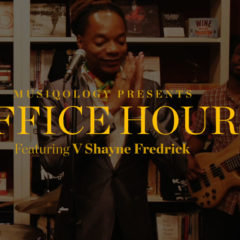“What’s Going On” is MusiQology’s weekly news round-up. Running each week, we curate a selection of relevant items from across the spectrum of popular culture, adding our own commentary and spin when it makes sense. With any luck, you’ll be able to spend a little less time browsing the web for what matters. We’ve got you covered.
This week in #WGO, we’re changing things up a little bit. There’s been so much great writing about music in the last few weeks that rather than our usual synopses, we’re going to share each article with a pull-quote so we can share more with you at once. Playing music is a conversational pursuit; the best music writing kind that starts its own.
The Atlantic: “Kendrick Lamar vs. Capitalism”
“This is, of course, one of the ongoing paradoxes around political art in America. It’s very hard to spread a critique of capitalism without using capitalism; it’s very easy for revolutionary messages to be co-opted by the very institutions and forces an artist might set out to change. When Lamar talks about the devil—code-named “Lucy” on To Pimp a Butterfly—he’s talking in part about the allure of joining the rich-to-get-richer class.” –Spencer Kornhaber
The Grio: “Jay-Z’s TIDAL: How could a music genius become so tone deaf?”
“Can we talk about jacking social justice tactics to push a service backed by already really rich people? This ain’t philanthropy; this a venture to make money and these tactics feel gross. It reeks of greed and being out of touch with your customers. You want 1 million paying $20/month or 100 million paying $8/month? It’s just extreme capitalism asking the consumer for another dime when their fight is with labels. It just doesn’t feel good or pure or about the art.” –Luvvie Ajayi
The New York Times Magazine: “25 Songs that Tell Us Where Music is Going”
[Editor’s Note: There are a LOT of great pieces within this lengthy list. This is just one.]
“The band’s name itself [The Internet] hints at an irreversible and inevitable shift in the way music works. For decades, the music industry fancied itself an apparatus for tastemaking, but as technology has made labels’ role less relevant, that has ceased to be the case. Listeners decide what’s popular now, and record labels have to find a way to attach themselves to it. Aside from a few big-name acts, most artists are doomed to languish in relative obscurity with middling profits. This is usually seen as a tragedy — the death of a musical middle class — but it has also presented an opportunity for artists to avoid the suffocating effects of the label machine. And so the Internet has carved out an entirely new corner of R.&B., thanks mostly to Bennett: an androgyne who sings seductive incantations about falling in and out of love with women.” – Jenna Wortham
Seven Scribes: “What We Bring to Light: A Conversation with John Legend”
“[John Legend’s] activism is not a side job. He’s not doing this work for the optics. He knows this stuff. Legend has chosen to fully engage, and he was kind enough to meet me for coffee to talk about his work.” –Josie Helen
The Washington Post: How Future Makes Us Feel the Slow, Cosmic Push of Time”
“The entirety of music acts this way to some degree. Songs help memorialize the present as it perpetually evanesces into oblivion — which charms us, but also makes us worry about how we might spend tomorrow. So while Future’s lyrics invoke various shades of melancholy, despondency, paranoia and panic, the drama of his work is always rooted in its grieving of the passage of time. What’s crazy is how the cumulative effect feels so ecstatic. One after the other, these songs free us from the dread they conjure.” –Chris Richards
“Formation” is a great song. Beyoncé is a great artist. But to glory in the song’s vision, one must also believe her success is that of the culture from which she arises, which she is at pains to name in her genealogy. To believe there is something broadly redeemable about “a black Bill Gates in the making” is to depend on the same cultural nationalism that takes the song as intolerable trespass. –Joshua Clover
“But Mrs. Obama’s tenure also coincided with the rise of social media: during the Obama presidency, Twitter went from upstart to global newswire; Facebook now counts over 1.5 billion users; and Instagram and Snapchat — platforms that didn’t exist a decade ago — dominate pop culture. With a click of an iPhone, Mrs. Obama can now reach audiences Mrs. Johnson and Mrs. Bush could only have dreamed of.” –Kwame Opam
Pitchfork: “Esperanza Spalding: Insubordinate by Nature”
“While the themes of the album aren’t entirely clear even to her, Spalding thinks of the record as an attempt to get back to a childlike curiosity and freedom in her practice—her version of Picasso’s famous declaration that, “It took me four years to paint like Raphael, but a lifetime to paint like a child.” “Emily knocked on the door of me, and I opened it and said, ‘Well, what do you want to do?’” Spalding says of her alter ego. “And she said, ‘I want to move and I want to be loud.’”” –Alex Frank

 Share On Facebook
Share On Facebook Tweet It
Tweet It








